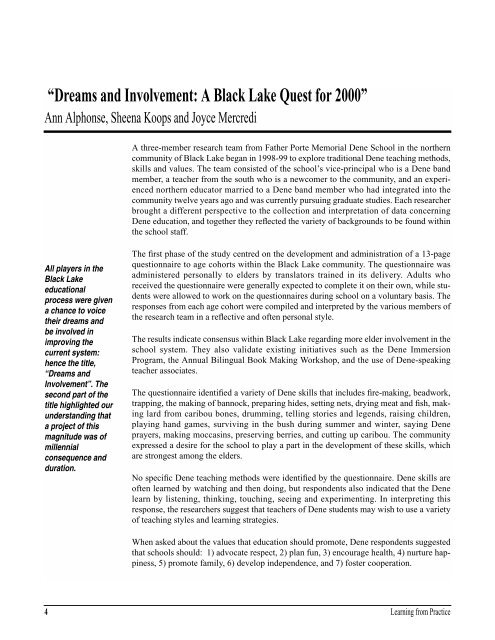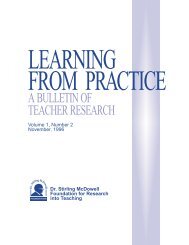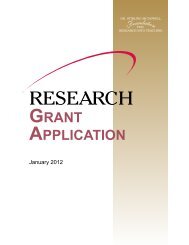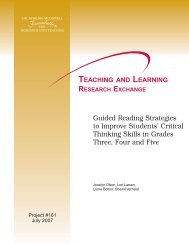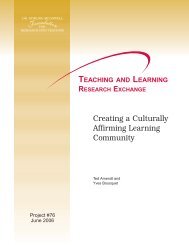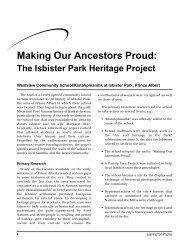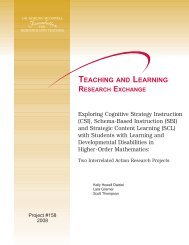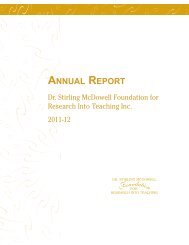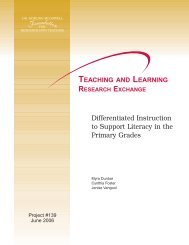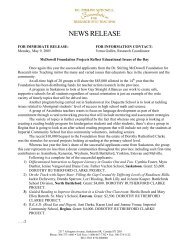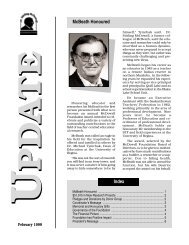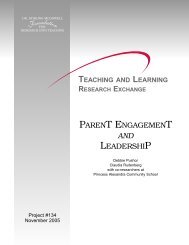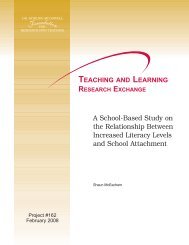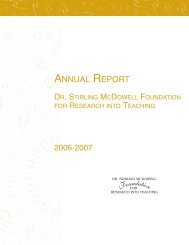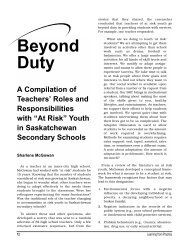Summary - Dr. Stirling McDowell Foundation for Research Into ...
Summary - Dr. Stirling McDowell Foundation for Research Into ...
Summary - Dr. Stirling McDowell Foundation for Research Into ...
You also want an ePaper? Increase the reach of your titles
YUMPU automatically turns print PDFs into web optimized ePapers that Google loves.
“<strong>Dr</strong>eams and Involvement: A Black Lake Quest <strong>for</strong> 2000”Ann Alphonse, Sheena Koops and Joyce MercrediA three-member research team from Father Porte Memorial Dene School in the northerncommunity of Black Lake began in 1998-99 to explore traditional Dene teaching methods,skills and values. The team consisted of the school’s vice-principal who is a Dene bandmember, a teacher from the south who is a newcomer to the community, and an experiencednorthern educator married to a Dene band member who had integrated into thecommunity twelve years ago and was currently pursuing graduate studies. Each researcherbrought a different perspective to the collection and interpretation of data concerningDene education, and together they reflected the variety of backgrounds to be found withinthe school staff.All players in theBlack Lakeeducationalprocess were givena chance to voicetheir dreams andbe involved inimproving thecurrent system:hence the title,“<strong>Dr</strong>eams andInvolvement”. Thesecond part of thetitle highlighted ourunderstanding thata project of thismagnitude was ofmillennialconsequence andduration.The first phase of the study centred on the development and administration of a 13-pagequestionnaire to age cohorts within the Black Lake community. The questionnaire wasadministered personally to elders by translators trained in its delivery. Adults whoreceived the questionnaire were generally expected to complete it on their own, while studentswere allowed to work on the questionnaires during school on a voluntary basis. Theresponses from each age cohort were compiled and interpreted by the various members ofthe research team in a reflective and often personal style.The results indicate consensus within Black Lake regarding more elder involvement in theschool system. They also validate existing initiatives such as the Dene ImmersionProgram, the Annual Bilingual Book Making Workshop, and the use of Dene-speakingteacher associates.The questionnaire identified a variety of Dene skills that includes fire-making, beadwork,trapping, the making of bannock, preparing hides, setting nets, drying meat and fish, makinglard from caribou bones, drumming, telling stories and legends, raising children,playing hand games, surviving in the bush during summer and winter, saying Deneprayers, making moccasins, preserving berries, and cutting up caribou. The communityexpressed a desire <strong>for</strong> the school to play a part in the development of these skills, whichare strongest among the elders.No specific Dene teaching methods were identified by the questionnaire. Dene skills areoften learned by watching and then doing, but respondents also indicated that the Denelearn by listening, thinking, touching, seeing and experimenting. In interpreting thisresponse, the researchers suggest that teachers of Dene students may wish to use a varietyof teaching styles and learning strategies.When asked about the values that education should promote, Dene respondents suggestedthat schools should: 1) advocate respect, 2) plan fun, 3) encourage health, 4) nurture happiness,5) promote family, 6) develop independence, and 7) foster cooperation.4Learning from Practice
On the basis of the in<strong>for</strong>mation received, the research team developed 49 recommendations<strong>for</strong> improving the education of Dene students. The recommendations addressteaching methods, the development of Dene skills, the incorporation of Dene values, andthe administration of schools <strong>for</strong> Dene communities. A second phase of the research projecthas been initiated to follow up on these recommendations. In this phase theresearchers plan to test how well their recommendations honour traditional Dene teachingmethods, content and values, and to consider how the school staff, which includes bothDene and non-Dene educators, can work towards their implementation.The report on phase one ends with the following paragraph:The modern school plays a daunting, yet exciting role in the emergence of theDene. It is imperative that the school purposefully and methodically plan toacknowledge and incorporate Dene teaching methods, skills, and values intothe classroom and school system. In so doing, the school validates the importanceand strength of students’ identity and heritage. Likewise, the schoolmust prepare students to be active citizens in the global community. In sodoing, the school empowers the Dene to share their unique voice: both addingtheir strength to the solutions of tomorrow and, at the same time, advocatingon behalf of their own needs and rights. It is not only an honour, but a responsibility,that the school play a significant role in creating a learningenvironment in which students can prepare themselves to walk and succeed inboth the Dene world and the global community.Father Porte Memorial Dene School, Black Lake<strong>McDowell</strong> <strong>Foundation</strong> researchers JoyceMercredi, Ann Alphonse and Sheena KoopsLearning from Practice 5


